|
 Growth mindset and
fixed mindset Growth mindset and
fixed mindset 
  How self
beliefs affect motivation and thus achievement. What
we believe about ourselves can greatly influence our
ability to get what we want out of life. Carol Dweck and
her associates have for many years investigated what
people believe about themselves and how this affects
their motivation, and their ability to accomplish tasks,
achieve goals, and function successfully in
life. She proposes, that people tend to have two
extremes of belief about themselves, that are the key to
their effectiveness or ineffectiveness. One extreme is
of a self that is an unchanging entity and the other
extreme is of a self that is constantly changing in
varying increments. Dweck asserts that one theory is
highly adaptive for the human condition (the theory of
an incremental changing self) while the other is
maladaptive for the human condition (the theory of a
self that is an unchanging entity). These self theories
can be termed respectively a growth mindset and a fixed
mindset. Curiously, this applies regardless of whether
the motivation is intrinsic or extrinsic. Although, as
we shall see, people with an extrinsic orientation tend
to also have a fixed mindset, and people who have an
intrinsic orientation tend also to have a growth
mindset. How self
beliefs affect motivation and thus achievement. What
we believe about ourselves can greatly influence our
ability to get what we want out of life. Carol Dweck and
her associates have for many years investigated what
people believe about themselves and how this affects
their motivation, and their ability to accomplish tasks,
achieve goals, and function successfully in
life. She proposes, that people tend to have two
extremes of belief about themselves, that are the key to
their effectiveness or ineffectiveness. One extreme is
of a self that is an unchanging entity and the other
extreme is of a self that is constantly changing in
varying increments. Dweck asserts that one theory is
highly adaptive for the human condition (the theory of
an incremental changing self) while the other is
maladaptive for the human condition (the theory of a
self that is an unchanging entity). These self theories
can be termed respectively a growth mindset and a fixed
mindset. Curiously, this applies regardless of whether
the motivation is intrinsic or extrinsic. Although, as
we shall see, people with an extrinsic orientation tend
to also have a fixed mindset, and people who have an
intrinsic orientation tend also to have a growth
mindset.
Potential,
nonlearners versus learners. The following is
quoted from Carol Dweck's book
"Mindset":
"Benjamin Barber, an
eminent sociologist, once said, 'I don't divide the
world into the weak and the strong, or the successes
and the failures... I divide the world into learners
and nonlearners.'
What on earth would
make someone a nonlearner? Everyone is born with an
intense drive [this site prefers need] to
learn. Infants stretch their skills daily. Not just
ordinary skills, but the most difficult tasks of a
lifetime, like learning to walk and talk. They never
decide it's too hard or not worth the effort. Babies
don't worry about making mistakes or humiliating
themselves. They walk, they fall, they get up. They
just barge forward.
What could put an end
to this exuberant learning? The fixed mindset. As soon
as children become able to evaluate themselves, some
of them become afraid of challenges. They become
afraid of not being smart. I have studied
thousands of people from preschoolers on, and it's
breathtaking how many reject an opportunity to
learn."
[On the other hand a]"...growth
mindset is based on the belief that your basic
qualities are things you can cultivate through your
efforts. Although people may differ in every which way
- in their initial talents and aptitudes, interests or
temperaments - everyone can change and grow through
application and experience.
Do people with this
mindset believe that anyone can be anything, that
anyone with proper motivation or education can become
Einstein or Beethoven? No, but they believe that a
person's true potential is unknown (and unknowable);
that it's impossible to foresee what can be
accomplished with years of passion, toil and
training."
A percentage sample of
humanity. Carol Dweck tested a sample of people
over time who were quite diverse, from preschoolers to
people of university age. She found that while people
may vary greatly as to how much they are inclined toward
a fixed theory or a growth theory, roughly 40% seemed
more inclined toward a growth theory and 40% seemed more
inclined toward a fixed theory. The other 20% were
undecided. This seems to this site, to be remarkable,
because personal experience seems to place the large
majority of people in the fixed mindset group. This site
suspects that Dweck's sample group may be inaccurate,
because the sample of humanity it was taken from was
mostly young. The subjects ranged only from university
students to preschoolers and this excludes the majority
of the adult population. Also, if this site's major
concerns are correct, it may well be that society tends
to mold people into a more fixed mindset as they get
older.
Self theories
'entity' versus 'incremental'. If Carol Dweck's
survey is correct, about 40 percent of the people in the
world, would believe that they each are an unvarying
entity and thus impossible to change. They would believe
that their intelligence is an unvarying entity, that
their abilities are an unvarying entities, and that they
are helpless to change any of it. On the other hand
about 40 percent of the people in the world would
believe the opposite, that they gradually improve by
increments. They would believe that their intelligence
increases in increments of knowledge and that their
abilities increase in increments according to how much
effort they apply to improving them.
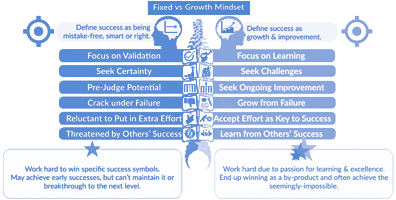 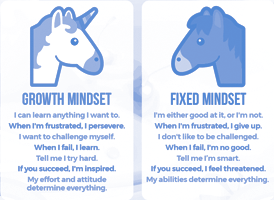 Mindset 'fixed' versus
'growth'. (This is a slightly more generalized
reformulation of the self theories.) If Carol
Dweck's survey is correct, about 40 percent of the
people in the world would believe that people are fixed
to their genetic heritage, and thus impossible to
change. They would believe that intelligence is fixed,
that abilities are fixed, and that they, and all other
people are fixed, and that we are all helpless to change
any of it. Conversely, about 40 percent of people in the
world would believe that they, and all others, gradually
develop and grow over time. They would believe that
intelligence grows with knowledge, and that abilities
improve and grow according to how much effort we apply
to improving them.
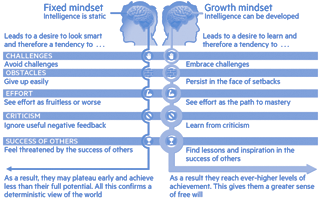
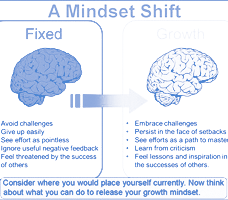
World theories
orientation 'constant' versus 'malleable'. (The
fixed/growth mindsets tend to change people beliefs
about the world.) If Carol Dweck's survey is correct,
about 40 percent of the people in the world would
believe that everything is constant and thus impossible
to change. They would believe that people are constant
and that the world is constant and that we are all
helpless to change any of it. Conversely about 40
percent of the people in the world would believe that
people are malleable and that they and others can change
if they so wish. They would believe that the world is
malleable and that anyone in the right place at the
right time, with sufficient effort, can change the world
or contribute to changing it.
 Behavior 'performance'
versus 'mastery'. The people who believe that
everything is fixed, tend to be set on maintaining
and validating their abilities, their intelligence
and their position in the world, by performing in
order that others may judge their intelligence,
abilities and status. The people who believe that
everything develops and grows, set out to learn all
they can and to improve all their skills so that
their intelligence will increase and their abilities
will develop and their eminence increase. They judge
themselves against their previous selves to see how
much they have improved. They seek to master any
abilities and skills they may need to do what they
want with their lives. Sometimes they try to learn
or accomplish the most difficult things, not because
they are easy, but because they are hard. After all
accomplishing things that are easy are hardly
accomplishments at all.
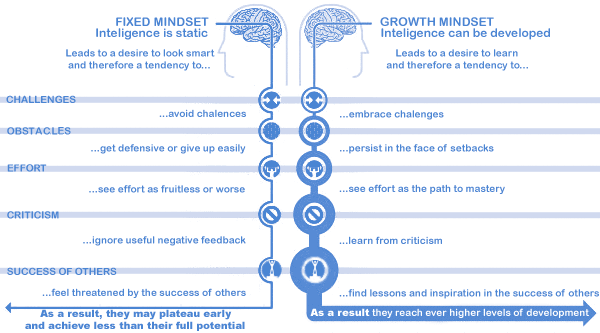
Brain
waves tell the story. The following is also taken
from Dweck's book "Mindset":
"You can even see the
difference in people's brainwaves. People with both
mindsets came to our brainwave lab at Columbia. As
they answered hard questions and got feedback, we were
curious about when their brain waves would show them
to be interested and attentive.
People with a fixed
mindset were only interested when the feedback
reflected on their ability. Their brainwaves showed
them paying close attention when they were told
whether their answers were right or wrong.
But when they were
presented with information that could help them learn,
there was no sign of interest. Even when they'd gotten
an answer wrong, they were not interested in learning
what the right answer was.
Only people with a
growth mindset paid close attention to information
that could stretch their knowledge. only for them was
learning a priority."
Common sense is often
wrong. Ability, intelligence and confidence
are not enough.
-
The belief that
students with high ability are more likely to
display mastery oriented qualities is wrong.
-
The belief that
success in school directly fosters mastery oriented
qualities is wrong.
-
The belief that
praise, particularly praising a student's
intelligence, encourages mastery oriented qualities
is wrong.
-
The belief that
student's confidence in their intelligence is the
key to mastery oriented qualities is wrong.
Belief, 'fixed' verses
'growth'. After extensive research on numerous
groups, Dweck and her colleagues gained an understanding
that this division of people into fixed or growth
mindsets tended to predict how successful, how accomplished,
how healthy and how happy people were.
People with a growth mindset were more successful,
accomplished and happy. Carol Dweck explains how people
with a fixed mindset manage to function as follows:
"Sure, people with the
fixed mindset have read books that say: success is
about being your best self, not about being better
than others; failure is an opportunity, not a
condemnation; effort is the key to success. But they
can't put this into practice because their basic
mindset - their belief in fixed traits - is telling
them something entirely different: that success is about being more gifted than
others, that failure does measure you, and that effort
is for those who can't make it on talent."
Some
of the conclusions Dweck etc. reached are the
following:
FIXED MINDSET PEOPLE
ARE:

-
Intelligence.
Fixed mindset people believe we are born with our
level of fixed intelligence, and that it changes
little over the course of our lives. They tend to
see how their intelligence is now as how it is going
to be in the future.
-
Intelligence and
trying hard. Fixed mindset people believe that
if we have to try hard to understand or to solve
problems, that this shows how low our intelligence
is. They believe that if our intelligence is high,
everything will be easy to understand and problems
will be easy to solve.
-
Abilities.
Fixed mindset people believe we are born with our
various fixed levels of ability and that these
change little over the course of our lives.
-
Abilities and
trying hard. Fixed mindset people believe,
that if we have to try hard to do things or to build
a skill, that this shows how inferior our abilities
are. They believe that if our abilities are great,
everything will be easy to do and that skills will
be easy to build.
-
Change.
Fixed mindset people believe they are born a
certain way, and that neither they, nor anybody
else, can do anything to change them. Likewise,
they believe other people are also born a certain
way and also cannot be changed. They see no point
in trying to change themselves or others. Fixed
mindset people are therefore more likely lump
people into stereotype straitjackets.
-
Change the world.
Fixed mindset people believe, though it seems to
defy common sense, that the world cannot be changed
and that it especially cannot be changed by them.
Though they see the world as changing, they believe
this is outside the ability of anyone to influence.
They see no point in trying to change the world if
nothing they do has any effect. However, because
they need the approval of others they will sometimes
claim they could have done things if they had tried
or there had not been some obstacle stopping them.
-
Validation.
Fixed mindset people believe their purpose in life
is to validate and live up to the statuses that
others have conferred on them. They do this by
continually trying to perform at the expected level
of various standards. Whether low or high status is
conferred on them, they accept it, and try to live
up to it or the appearance of it at least. This
validation of others' judgments of themselves often
leads to a personal addiction to others positive
judgements (their personal validation need).
-
Challenges.
Fixed mindset people tend to avoid challenges and
risk. They are willing to pass up learning
opportunities if they are likely to reveal
inadequacies or entail errors.
-
Performance.
Fixed mindset people tend to perform for others
to judge, and not for their own edification.
They are more interested in the appearance of
being knowledgeable or skilled at work, rather
than the actuality of it. They can pass exams,
get degrees, but only a minimal amount of real
learning trickles through. The seek performance
status.
-
Effort. Fixed
mindset people tend to believe that things should be
accomplished with little effort. They believe that
having to exert effort indicates that people have
insufficient knowledge, skill, or intelligence. They
therefore tend to minimize effort, and feel it shows
their lack of intelligence and ability when they
find it necessary to try hard.
-
Obstacles.
Fixed mindset people see obstacles as a threat. They
see mistakes, difficulties in understanding and
doing, as signs of weakness in their intelligence
and abilities. They tend to want to avoid obstacles
if they can, preferring to do easy work rather than
hard work. Also they do not think others can or
should try to help others to overcome obstacles.
-
Failure. Fixed
mindset people see failure as the refutation of the
statuses that have been conferred on them. They see
failure as indictment of their stupidity and
incompetence. For them it is not an option. They are
thus ever afraid of failure which threatens their
feelings of worth, status and esteem.
-
Response to
failure. In response to failure, fixed
mindset people tend to indulge in negative self
talk. They tend to over estimate the amount or
extent of the failure. They tend to blame others for
their failure or hiding the failure rather than be
responsible. They tend to lose faith in their
abilities and intelligence to be able to still do
things they have already accomplished. They also
tend to give up when they fail.
-
Giving up.
Fixed mindset people tend to give up easily when
faced with obstacles or difficulties. They give up
before they have exhausted their strategies. They
are more likely revert to wild guesses. They are
more likely to lose interest in things they are
failing at or finding difficulty with.
-
Success. Fixed
mindset people revel in any successes which they see
as validating their high intelligence and inborn
competence. Their need for success makes them fear
not being successful. They are thus ever seeking
successes which bolsters their feelings of worth,
status and esteem. But success for fixed minded
people is more about how it appears to others than
actual accomplishment and they are addicted to it.
However they are threatened by the success of
others.
-
Conditional.
Fixed mindset people live lives that are
conditional. Their confidence, self worth and self
esteem rise and fall on what others hold as
standards, and on their performance ability in
obtaining or passing those standards. This this may
go back to their childhood where the love and esteem
provided by their parents was probably conditional.
-
Learning. Fixed
mindset people do not see learning of value in
itself, but rather see it as only having value if
assessed.
-
Motivation.
Fixed mindset people are not usually motivated by
intrinsic motives and are mostly motivated by
extrinsic motives. Whether they are trying for an
external reward, or they are trying to gain the
approval of some others, or they are trying to pass
a standard, or they are simply trying to live up to
expectations, it is all extrinsic motives.
-
Cheating. Fixed
mindset people are so concerned with appearance and
status that they are more likely to consider
cheating.
-
High Achievement.
Some fixed mindset people start off strong early in
life accomplishing much, but become more and more
fearful of risk and so take less and less chances as
time goes by. This causes their accomplishments to
gradually diminish till often they are no better
than average or even worse. Their academic
achievements are often spectacular when young, but
diminish as they find the work difficult or as they
have to deal with failures.
-
Low Achievement.
Some fixed mindset people are what are often
referred to as losers. Such people feel generally
helpless in most situations. Such talent as they
have is so overwhelmed by their fixed mindset that
they never achieve anything of worth. >
GROWTH MINDSET PEOPLE
ARE:

-
Intelligence.
Growth mindset people believe, that we a born with a
malleable intelligence, and that it changes in
response to accumulation of knowledge and
understanding over the course of our lives. They
tend to see how their intelligence is now, as just
that now, and in no way indicating anything about
the future.
-
Intelligence and
trying hard. Growth mindset people believe
that in order to increase our intelligence we have
to try hard to improve and understand or to solve
problems, and that intelligence is a function of
learning. They believe that our intelligence can
only become high by putting every effort into the
accumulation of knowledge and understanding, because
intelligence is knowledge and understanding.
-
Abilities.
Growth mindset people believe we a born with various
malleable potentials, and that the only way to turn
those potentials into abilities is to work hard to
develop the skills necessary to those abilities
through constant learning. They tend to see
abilities as ever developing and evolving over the
period of their life. Even potential they do not see
as fixed because they believe it is unknowable.
-
Abilities and
trying hard. Growth mindset people believe
that we have to try hard to do things or to build
skills, and that the only way to develop abilities
is to put in the effort to learn and maintain them.
They believe that nothing is worth doing or worthy
of them if it is accomplished to easily. They
believe that anything worth doing must stretch and
challenge them, so that they are always leaning the
most they possibly can.
-
Change. Growth
mindset people believe they are born with infinitely
flexible and malleable bodies, like silly putty,
that they can change and mold into whatever they
wish. They believe that the environment can change
them, but only if they allow it to. Likewise, they
believe other people are also born as flexible and
malleable as them, and though they can be changed by
others, that they should be changed by themselves.
They see the only point of living is to try to
change themselves or others for the better. Growth
mindset people are remarkably free of prejudice, and
far less likely to think of people in terms of
stereotypes, because they believe in this ability of
all people to change.
-
Change the world.
Growth mindset people believe that the world is in
constant change and that anybody and everybody can
and should contribute to that change. They are
especially sure that the world is open to
improvement, and that they can be highly
instrumental in bringing about such improvements.
They see the world as changing mostly through the
efforts of people like themselves who try to change
it and believe it can be changed by them. They see
the main point of living in trying to change the
world for the better.
-
Validation.
Growth mindset people see no purpose in trying to
validate others opinions of them, or to try and live
up to the statuses that others have conferred on
them. They feel validated only by their own judgment
of their own continual improvement. They are
uncaring of the opinions of others and only perform
to standards of others, when society seems to
present no other course of progressing.
-
Challenges.
Growth mindset people tend to love challenges and
are willing to take reasonable risks in order to
improve. They are often bored by tasks that are so
easy as to offer no challenge. They are quite
willing to risk looking stupid if the opportunity to
learn seems sufficiently challenging. They will
sacrifice opportunities to look smart in favor of
challenging their intellect.

-
Performance.
Growth mindset people tend to perform only for
themselves and for their own edification. They are
more interested in the increasing their knowledge
than of being thought knowledgeable. They are more
interested in being skilled than being thought
skilled. They would rather do quality work, than be
thought to have done quality work. They can pass
exams, get degrees, but are only interested in doing
this in so far as society is likely to prevent them
from doing what they want otherwise. They seek
continuous incremental improvement.
-
Effort. Growth
mindset people tend to believe that the only way to
improve is through effort. They believe that
exerting effort is how knowledge, understanding and
abilities are acquired. They therefore tend to
maximize their efforts to learn, and feel that is
how they expand their intelligence and skills.
Although they do not believe anyone can do anything
they believe nothing is necessarily impossible. They
believe what is possible is unknown and that the
only way to check is to try.
-
Obstacles.
Growth mindset people see obstacles as challenges.
They see mistakes, difficulties in understanding and
doing, as signs that they need to try new strategies
and work harder. They tend to want tasks that
involve obstacles, so they can be challenged and
overcome those obstacles. They prefer hard work to
easy work. For them easy work accomplishes nothing
of worth.


-
Failure. Growth
mindset people see failure as the ultimate
challenge, as an opportunity to really dig in and
try something new, to work harder and to persist by
trying again. They basically redouble their efforts
in the face of failure. They see failure as an
opportunity to learn. They are thus never afraid of
failure, and only more resolved to do better next
time when it occurs.
-
Response to
failure. In response to failure growth
mindset people tend to indulge in positive self
talk. This is usually in the form of self
instructions to work harder and increase effort and
try new strategies, but sometimes it takes the form
of talk to reinforce their self theory such as, "I
love a good challenge". They tend to under estimate
the amount or extent of the failure, to become more
determined to succeed, and remain confident in their
ability to do so.
-
Giving up.
Growth mindset people tend not to give up even when
faced with many obstacles or difficulties and
persist, often to an unreasonable extent. They may
give up using one strategy only to try many others.
They are more likely to increase their concentration
and redouble their efforts. They are more likely to
become even more interested in things because they
are failing at or finding difficulty with tasks.
  
-
Success. Growth
mindset people, like others, enjoy their successes,
which they see as the outcome of their strategies,
effort and hard work. They are thus, far more often
successful in any of their undertakings and creative
in overcoming their failures.
-
Conditional.
Growth mindset people live unconditional lives.
Their confidence, self worth and self esteem, are
very stable and independent of conditions others try
to place on them. This is because they are always
perceiving evidence of their own improvement. Their
confidence is not confidence in abilities or
intelligence, but rather confidence in their
aptitude to improve through trying various
strategies, applying more effort, and persisting.
Their esteem and self worth are generated by their
own perception of themselves as being increasingly
successful, despite perhaps, a current temporary
failure. This likely goes back to their childhood,
where the love and esteem provided by their parents
was always unconditional.
-
Learning.
Growth mindset people see learning as of value in
itself. As a result their learning tends to be
meaningful, well integrated into their cognitive
structure, and not easily forgotten. They tend to
enjoy and love learning, which in turn, makes them
good candidates for being life long learners.
-
Motivation.
Growth mindset people are motivated by intrinsic
motives and are hardly ever motivated by extrinsic
motives. Though they are normally motivated by
intrinsic motives, they tend to be flexible, in that
they are able to tackle performance goals or growth
goals with equal enthusiasm, if they perceive the
performance goals to be necessary to their intrinsic
motivation. Whether they are trying gain entry to a
school, or pass a standard required for entry to a
profession of choice, they are still primarily
internally motivated.
-
Cheating.
Growth mindset people are very unlikely to cheat, as
they see value only in knowing and understanding and
see no value in demonstrating skills, abilities or
knowledge that they do not have. For them only real
skills and accomplishments are worth anything.
Status or eminence based on lies is abhorrent to
them.
-
High Achievement.
Some growth mindset people start off strong early in
life, accomplishing much early. They tend to
continue in this manner throughout their lives like
Mozart if the growth mindset is maintained. Others
may acquire a growth mindset later in life. These
growth mindset incremental self-theorist's academic
achievements may take no spectacular leaps, but show
a steady growth and improvement till eventually
resulting in high achievement. Despite this, they
are often at their best when facing difficulties.
-
Low Achievement. Similarly
some growth mindset people start off weak early in
life, but slowly become more and more skillful and
knowledgeable as time goes by. Their absolute faith
in the inevitability of their success enables them
to gradually catch up to others, even prodigies, and
eventually surpass them. They do this by effort and
hard work. When young their academic achievements
are often inferior, but gradually they overcome
their flaws and learn the necessary skills.
How to turn fixed
mindsets into growth mindsets.
Hopeful signs. There
is a very hopeful side to this idea of self theories or
mindsets. One of the things that Carol Dweck established
early on in her research was that it was relatively easy
to change a person's mindset from fixed to growth or
entity to Incremental and vice versa, at least
temporarily. In experiment after experiment it was made
clear that a very simple intervention could change
completely how people thought and acted, at least for
the period of the experiment. Dweck identified a number
of different sorts of intervention that could quickly
help or induce people to have a more incremental self
theory. They are:
-
Knowledge of self
theories. The mere knowledge of the existence
of these self theories or mindsets were instrumental
in moving people toward the incremental or growth
side.
-
Nature versus
nurture. Nature versus nurture is an old
debate, but its importance, as Dweck explains, is
not in which side is true, but rather in that,
whichever idea we believe decides which side we
gravitate toward, the entity theory or the
incremental theory. The mere inclusion of an article
supporting nurture will automatically move people
toward having an incremental theory at least for the
period of the experiment.
-
Facilitation by
praise. Praise of entity aspects of people
(intelligence/abilities) or even work (competence)
move people toward the an entity theory. This
encourages people to feel entitled and at the
same time dependent on the praise, and
ultimately makes them fragile in the face of
evidence to the contrary. However,
praise of problem solving strategies, praise of
effort, praise of persistence and praise of hard
work all move people toward an incremental theory.
-
Facilitation by
criticism. Criticism of the sort that people
need to try different strategies, that they need to
put in more effort, that they need to be more
persistent or that they need to try harder all move
people toward forming an incremental self theory and
a growth mindset.
-
Improvement.
One way Dweck and co. discovered to help people to
change to an incremental theory, was to consistently
draw their attention to the amount of improvement
they had made. Drawing attention to improvement is
actually illustrating increment.
-
Attitudes and
expectations. The attitudes of the role models
around children, usually their parents and teachers,
has an important effect
on whether children form an entity theory or an
incremental theory. If parents have an incremental
theory their every action is modeling that theory
for their children to absorb. Likewise, teachers who
have an incremental theory will believe their
students can and will change and so help bring this
about, by the force of their belief through self
fulfilling prophesy. Other role models affect people
similarly in later life. What people believe about
children is also demonstrably able to effect the
kind of mindset they develop.
THE GROWTH MINDSET, HOW
TO GET ONE.
 Your brain
grows by being exercised. Carol Dweck and her
associates have developed a workshop for students who
were losing interest and motivation in schoolwork. The
purpose of the workshop is to move students from having
a fixed mindset to having a growth mindset by lending
academic authority to the growth mindset. The following
is a excerpt from what those students are taught in part
to instigate that change: Your brain
grows by being exercised. Carol Dweck and her
associates have developed a workshop for students who
were losing interest and motivation in schoolwork. The
purpose of the workshop is to move students from having
a fixed mindset to having a growth mindset by lending
academic authority to the growth mindset. The following
is a excerpt from what those students are taught in part
to instigate that change:
"When they do think
about what intelligence is, many people believe that a
person is born either smart, average, or dumb - and
stays that way for life. But new research shows that
the brain is more like a muscle - it changes and gets
stronger when you use it. And scientists have been
able to show just how the brain grows and gets
stronger when you learn."

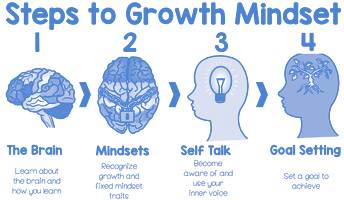
"When you learn new
things, these tiny connections in the brain actually
multiply and get stronger. The more that you challenge
your mind to learn, the more your brain cells grow.
Then, things you once found very hard or even
impossible - like speaking a foreign language or doing
algebra - seem to become easy. The result is a
stronger smarter brain."
True or false. The
point of this above passage, was to change what people
believed was possible, so its actual truth or falsity
was unimportant as long as people believed it. However,
if you take a look at our section on the plastic brain,
you will see that there is considerable evidence that
this is true.
SIX
WAYS OF TIPPING SELF THEORIES OR MINDSETS TOWARD
GROWTH.
-
 Knowledge of self theories. Carol Dweck has
just written a book called "Mindset",
a popular non technical book for the general public,
and she did this a the behest of her students. Her
students felt transformed by her lectures on
mindsets, which they felt moved their self theories
from entity theories to incremental self theories.
Because they felt so transformed, they felt the
general public needed to be informed about Dweck's
work. This site concurs with this belief that merely
having knowledge of fixed and growth mindsets tends
to begin to move fixed minded people toward a more
growth minded orientation. This site highly
recommends that anyone should read
"Mindset", especially parents and teachers who
are so influential in shaping mindsets.
Knowledge of self theories. Carol Dweck has
just written a book called "Mindset",
a popular non technical book for the general public,
and she did this a the behest of her students. Her
students felt transformed by her lectures on
mindsets, which they felt moved their self theories
from entity theories to incremental self theories.
Because they felt so transformed, they felt the
general public needed to be informed about Dweck's
work. This site concurs with this belief that merely
having knowledge of fixed and growth mindsets tends
to begin to move fixed minded people toward a more
growth minded orientation. This site highly
recommends that anyone should read
"Mindset", especially parents and teachers who
are so influential in shaping mindsets.
-
 Nature versus nurture. Are we the puppets of
our genes or do we have freewill? Are we born with a
fixed amount of intelligence, or does our
intelligence build in increments over time
constantly growing and becoming more with our
growing knowledge? Are we born with fixed abilities,
or are these too developed over time in increments
depending on the amount of effort we put in and the
persistence we maintain?
Nature versus nurture. Are we the puppets of
our genes or do we have freewill? Are we born with a
fixed amount of intelligence, or does our
intelligence build in increments over time
constantly growing and becoming more with our
growing knowledge? Are we born with fixed abilities,
or are these too developed over time in increments
depending on the amount of effort we put in and the
persistence we maintain?
Carol Dweck believes
our potential can never be known. It is not known at
conception or birth. When we die a small part of
what was our potential is then known. But it is
obvious that we could have learned more. We could
have further improved our abilities. We could have
learned other abilities. We could have learned or
improved other skills. Even in death our potential
is not fully known.
However
there is also another way to think about this idea.
In his book "Peak"
Anders Ericsson suggests, that like talent,
potential, for the most part, is not innate. He
says:
"The traditional
approach [to learning] is
not designed to challenge homeostasis. It assumes
consciously or not, that learning is all about
fulfilling your innate potential and that you can
develop a particular skill or ability without
getting too far out of you comfort zone. In this
view, all that you are doing with practice -
indeed, all you can do - is to reach a fixed
potential.
Ericsson
suggests that potential is not fixed at all and that
when we practice we reshape both our bodies and our
brains to such an extent that what was impossible
before becomes possible. He continues:
"...the goal
is not just to reach your potential but to
build it... getting out of your comfort zone -and
forcing your brain or your body to adapt. But once
you do this, learning is no longer just a way of
fulfilling some genetic destiny; it becomes a way
of taking control of your destiny and shaping your
potential in ways that you choose."
Regardless of who or
what is right about all this, what we believe about
nature and nurture makes a difference to the type of
mindset we develop. Carol Dweck and her associates
have shown that what we believe about nature and
nurture, is essential in the structuring of our self
theories. Are our abilities provided by our genes or
are abilities developed by our intentions and our
environment? Is our intelligence provided by our
genes or is intelligence developed by our intentions
and our environment?
Nature.
If we believe our intelligence, our talents, our
abilities our skills are provided by our genes then
we tend to develop a fixed mindset and a fatalist
outlook. Calvin below is not a true fatalist but
rather someone who tries to make the philosophy
serve his own ends. He fails because fate is the
opposite of change.
Nurture.
If we believe that our environment, our intentions
and our efforts, create our intelligence, our
talents, our abilities and our skills, over our
lifetime, then we will probably develop a growth
mindset.
As to the matter of
intelligence, which these days is normally measured
by an IQ test, it is interesting to note, as Dweck
points out, that it was not developed to measure
something fixed. The developer of the test, Alfred
Binet, created the IQ test in order to identify
children who were not profiting from the Paris
public schools, so that new educational programs
could be designed to get them back on track. Here is
a quote from Binet's book
"Modern Ideas About Children":
"A few modern
philosophers... assert that an individuals
intelligence is a fixed quantity, a quantity which
cannot be increased. We must protest and react
against this brutal pessimism... With practice,
training, and above all, method, we manage to
increase our attention, our memory, our judgment
and literally to become more intelligent than we
were before."
Ultimately it does not
matter whether nature or nurture is correct, and it
is best we never know the answer, unless it is
nurture. Because, if we believe nurture is correct,
this gives us an advantage in life, it allows us to
be inclined toward a growth mindset, which in turn,
enables us to change and become more competent in
everything we do.
Here's the thing. Our
genes are fixed at conception (at least at the
moment). These genes, however, for the most part are
like switches. Both our environment and our own
choices create chemical activators and repressors in
our bodies that turn these genes on and off. Many
genes lie dormant until they are activated these
chemical activators which are in turn created by
something in our environment or by some change we
create in ourselves with our intentions. Our
environment and our intentions are not fixed.
Sometimes we cannot do much about our environment
and sometimes we can change it radically. But our
motivation, our intentions, and our choices are all
subject to our free will and are open to learning
and continuous improvement.
-
 GROWTH PRAISE. Facilitation by praise. In
terms of Carol Dweck's mindsets, good praise
means the reinforcing of the idea that you can
change what you are. If you seem less
intelligent you can learn and become more
intelligent. If you lack skills you can learn
them. If you are socially incompetent you can
learn how to be socially competent. If you are
not so beautiful you can do something about that
also. Here is what Dweck said, "If
the wrong kinds of praise lead kids down the
path of entitlement dependence and fragility,
maybe the right kinds of praise can lead them
down the path of hard work and greater
happiness."
How do you convey this? You praise the process
not the person. Praise how the person has
improved and is improving. If you praise the
person you send a message that their
intelligence, their talents, their abilities, or
their skills are fixed in that moment. This
encourages a fixed mindset. Praising someone's
work has similar problems. Of course you must be
able to give positive feedback but this can be
phrased to involve the praise of strategies and
improvement
GROWTH PRAISE. Facilitation by praise. In
terms of Carol Dweck's mindsets, good praise
means the reinforcing of the idea that you can
change what you are. If you seem less
intelligent you can learn and become more
intelligent. If you lack skills you can learn
them. If you are socially incompetent you can
learn how to be socially competent. If you are
not so beautiful you can do something about that
also. Here is what Dweck said, "If
the wrong kinds of praise lead kids down the
path of entitlement dependence and fragility,
maybe the right kinds of praise can lead them
down the path of hard work and greater
happiness."
How do you convey this? You praise the process
not the person. Praise how the person has
improved and is improving. If you praise the
person you send a message that their
intelligence, their talents, their abilities, or
their skills are fixed in that moment. This
encourages a fixed mindset. Praising someone's
work has similar problems. Of course you must be
able to give positive feedback but this can be
phrased to involve the praise of strategies and
improvement
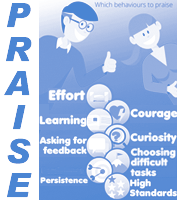
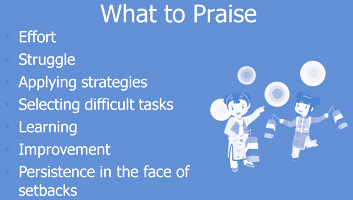 So what can you praise?
1
Praise the amount of challenge that is being
attempted.
2 Praise the obstacles being overcome.
3 Praise the problem solving strategies that were
used.
4 Praise the amount of hard work that was done when
something was accomplished.
5 Praise the persistence or perseverance despite
mistakes, setbacks and failures.
6 Praise the amount of knowledge that has been
understood and absorbed.
7 Praise the choosing of difficult tasks.
8 Praise the overcoming of setbacks and failures.
9 Praise how hard the person has worked to achieve
some result.
10 Praise the high standards to which the person has
held him/herself.
11 Praise the amount of improvement that has been
accomplished.
12 Praise how the person has handled feedback
whether positive or negative.
13 Praise the person for asking for feedback.
14 Praise the the amount of effort expended in
accomplishing something.
HERE ARE SOME EXAMPLES
OF GROWTH PRAISE AND ENCOURAGEMENT.
Only
something of value is worthy of praise. It
is not enough to praise these qualities. as
expressed above, when praising. Praising requires
that there be some accomplishment or virtuous action
to be praised. There is no growth or growth mindset
development if there is no action to help others or
some great accomplishment. Hard work that
accomplishes nothing though admirable does not
deserve praise. Strategies that work and bring about
results are worthy of praise but strategies that do
not work are not worth anything. Persistence though
highly admirable when something good is produced is
self defeating and obstinate when nothing is
produced and deserves no praise. Praise of effort is
admirable when something great is achieved but is
worth nothing if nothing is achieved. Hard work,
perseverance, strategies and effort have little
value if there is nothing to show for them. Also
this kind of praise is empty and leads to a fixed
mindset.
Encouragement.
Obviously much of the time children or people in
general will fail, they will make mistakes, they
will encounter difficult obstacles, and they will be
confronted with seemingly insurmountable challenges.
If we cannot praise them what can we do? The answer
is of course that we must encourage them. But
encouragement that does not praise requires some
special thought. What follows are some examples of
encouragement.
Encouragement is often
better that praise as it focuses the receiver on
their continuing growth, improvement and alternative
strategies needed to continue. But encouragement too
has it's pitfalls. If you just say, "You can do it,"
then it is implied that no struggle or effort is
needed. What the learner can do now is not
important. What is important is what the learner can
do in the future after effort and struggle and
learning. While it is never certain that something
can be done it is certain that potential is always
unknown given unlimited hard work and effort.
Also praising effort
where nothing is accomplished is hollow praise. It
may encourage in the short term but in the long term
it is toxic. It implies that making of a good effort
is enough in itself.
Failure and setbacks
are when encouragement is most needed, but at the
same time it is essential that the difficulty is not
minimized. It should be made clear that winning is a
choice that usually requires an immense effort.
Another choice is to do things just to learn and or
have fun. The right kind of encouragement is also
vital when learners are judgmental of their own
actions.
PRAISE. Here are some praise variations
of examples from Dweck's book:
These examples should
and do have the following things in common that lead
to a growth mindset:
1/ There is
something done or invented that is worthy of praise.
2/ The praise is
not about the person or even what was done but
rather about the process that resulted in something
worthy of praise. 14 items were given above as
possible processes to praise.
First, let us look at
praising
improvement.
Second, let us look
at praising strategies.
Third,
let us look at praising challenge.
Fourth,
let us look at praising effort
and hard work.
-
 Facilitation by Criticism. Growth Criticism. As with
praise, criticism can be a way of reinforcing the
mindset of the person being criticized. In her
book "Mindset" Carol Dweck Has this to say about
criticism:
Facilitation by Criticism. Growth Criticism. As with
praise, criticism can be a way of reinforcing the
mindset of the person being criticized. In her
book "Mindset" Carol Dweck Has this to say about
criticism:
"We
always hear the term constructive criticism. But
doesn't everyone think the criticism they give
their children is constructive? Why would they
give it if they didn't think it was helpful? Yet
a lot of it is not helpful at all. It's full of
judgement about the child. Constructive means
helping the child to fix something, build
abetter product, or do a better job."
So how do we covey to learners that they could
be performing better and how they might go about
improving? If a leaner seems stuck and unable to
improve their knowledge they need to be made
aware of it and they need to be guided on how
they might learn more and so expand their
knowledge. If they are socially
incompetent you can encourage them to learn how
to be socially competent. If they are not so
beautiful you can encourage them to learn how to
improve other qualities that can make them
attractive to others. How do you convey this?
Criticism ia complex subject and for more
information check out the criticism page here.
However some simple rules when criticizing may
be of help. Firstly criticism must help fix or
improve something. It is not about now it is
about the future.
Feedback.
In order to fix something (a skill, an activity,
a movement or an action) a learner needs
feedback about what they are doing right and
what they are doing wrong. In other words they
need negative and positive feedback. Negative
feedback should come with hints or tips of how
to improve.
It may be true
that a very skilled person may also be very
skilled in assessing his or her own actions and
be able, without help, to self-correct their own
activities or actions. However, a person just
beginning to learn a skill is in definite need
of all the mentoring and advice they can get as
they are bound to have little skill in self
assessment. It is also worth noting that no
person is so skilled that they cannot learn from
the advice of someone who has superior skill.
Criticizing
their effort and hard work. If they
lack skills they can be made to believe they can
learn those skills. One of the simplest ways
Dweck and co. found to help move people from an
entity theory to an incremental theory, was to
simply point out that the reason people had
failed or done poorly was because they hadn't
tried hard enough. All they had to do was put in
more effort and work harder the next time.
 Criticizing
their perseverance or persistence. It
is essential that learners are able to overcome
difficult obstacles, recover from setbacks, and
to see mistakes as learning opportunities. They
must also be able to get up and try again after
failing. It is therefore important to criticize
any lack of tenacity
grit, persistence, or
perseverance. It should be impressed on learners
that they they should not give up until all
possibilities have been exhausted as all
learning is a struggle. This is not to say they
should cling obstinately to trying but that they
should not give up easily.
 Criticizing
their inability to challenge themselves.
The beliefs of those learners with a fixed
mindset will always impose limitations on them.
If they believe they are bound the genetic
template provided by their parents then it will
always be difficult for them to attempt
difficult things. Learners are often unable to
challenge themselves because they are afraid.
They are afraid of failing, of being wrong,
making mistakes, embarrassing themselves. The
weakness of the challenge can be criticized or
the amount of challenge that is being attempted
can be criticized. Or how the person is working
or has been working can be criticized. How much
the person has improved and is improving can be
criticized. The lack of perseverance or
persistence can be criticized.
 Criticizing
their strategies and approach to strategies.
It is important foe learners to try many
different types of strategies when problem
solving. A critic can therefor criticize the
problem solving strategies that were used. The
number, the variety and the quality of the
strategies used can all be criticized.
-
 Improvement. Drawing attention to
improvement is the easiest way of facilitating
the development of a growth mindset. The easiest
way to do this is to make a comparison between
how things are now and how they were in the
past. It would be very unusual if nothing were
learned. It is just a matter of, instead of
saying how good something is, you say how much
better it is than it was before. If you want to
say how clever someone is, say instead how much
more knowledgeable a learner has become compared
to years past. If you want to say how well your
child has done in his school work, simply tell
him how much better he has done this year
compared with last year. If you want to say how
beautiful and creative a piece of artwork is,
you simply say how much more beautiful and
creative it is compared with work the person has
done in the past. It is easy for teachers to say
how much some work has improved or how much more
the person knows than just a few months back,
because at school, we are in a position to be
absorbing knowledge at a phenomenal rate.
(Although many of us, unfortunately, are
forgetting it at a similar rate.) Still the
knowledge we have is always greater than before.
The skills we have, are always more than before.
Improvement. Drawing attention to
improvement is the easiest way of facilitating
the development of a growth mindset. The easiest
way to do this is to make a comparison between
how things are now and how they were in the
past. It would be very unusual if nothing were
learned. It is just a matter of, instead of
saying how good something is, you say how much
better it is than it was before. If you want to
say how clever someone is, say instead how much
more knowledgeable a learner has become compared
to years past. If you want to say how well your
child has done in his school work, simply tell
him how much better he has done this year
compared with last year. If you want to say how
beautiful and creative a piece of artwork is,
you simply say how much more beautiful and
creative it is compared with work the person has
done in the past. It is easy for teachers to say
how much some work has improved or how much more
the person knows than just a few months back,
because at school, we are in a position to be
absorbing knowledge at a phenomenal rate.
(Although many of us, unfortunately, are
forgetting it at a similar rate.) Still the
knowledge we have is always greater than before.
The skills we have, are always more than before.
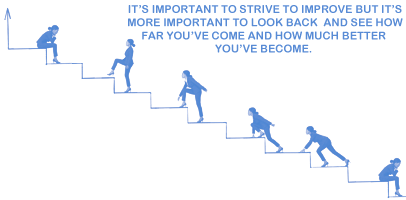
 Another way to
draw attention to improvement is to make
predictions and or promises that learners will
improve. The best kinds of teachers make such
promises but they do so by drawing into a pact.
They promise to facilitate massive improvement
but only if the learners will commit to
providing their utmost exertion to learn.
It may well be,
the real function of tests or exams is to simply
provide students with feedback about how much
they have improved. Tests could be prepared in
such a way, as to compare them with previous
tests or with previous test questions. The thing
is, tests could be about how much our mental
skills have improved, how much more knowledge we
have stored away, and how much better our
understanding of the universe has become, but at
present this is not the case.
-
 Attitudes. Children with a growth mindset
usually turn out to have grown up in a household
where at least one of their parents has had a
growth mindset. These parents often indulge in a
kind of growth self talk which can rub off on
their children. Some such children when facing
difficulties say things like, "I hoped this
would be informative." or, "Mistakes
are our friends." or, "I love a good
challenge." Such children have clearly
grown up in a household where such comments are
often heard and so repeated. Such households,
must have been places where the unexpected was
embraced, challenges enjoyed and where failure
triggered determination to try again and do
better.
Attitudes. Children with a growth mindset
usually turn out to have grown up in a household
where at least one of their parents has had a
growth mindset. These parents often indulge in a
kind of growth self talk which can rub off on
their children. Some such children when facing
difficulties say things like, "I hoped this
would be informative." or, "Mistakes
are our friends." or, "I love a good
challenge." Such children have clearly
grown up in a household where such comments are
often heard and so repeated. Such households,
must have been places where the unexpected was
embraced, challenges enjoyed and where failure
triggered determination to try again and do
better.
Role models.
This parental attitude above turns the parents
into role models that exemplify the growth
mindset and the children naturally copy their
behavior. However, it is possible for parents to
espouse growth mindset behavior while their
actual actions show them acting with a fixed
mindset. This kind of behavior is likely to have
the wrong effect creating learners with fixed
mindsets. This happens because this kind of
hypocritical behavior, though often used by
parents, never works. For role models actions
are far more important than words and are far
more likely to be copied.
Ignition.
Ignition refers to the idea (propose by Daniel
Coyle) that when we see someone we know well
perform in a highly skilled manner it may
inspire us to work hard to try and do the same.
This is because we know it can be done and we
know they worked very hard to be that skilled.
This idea is consistent with a growth mindset.
 Expectations.
Expectations are another kind of attitude that
can bear heavily on the kind of mindset children
develop. If parents believe their children are
smart, even if they do not tell them so, it will
tend to somehow be conveyed to them. But as
already pointed out, encouraging children to
believe that they are smart is not helpful as it
encourages a fixed mindset. If simply believing
children are clever is almost the same as
telling them so, then expecting children to do
well without effort, would clearly not be
helpful in encouraging a growth mindset. Dweck
believes that the research conducted by
Rosenthal and Jacobson on teacher expectations
was widely misinterpreted to mean, that teachers
when expecting students to do better, tended to
tell those students or conveyed to them in other
ways that they thought they were smart. On
reading "Pygmalion in the Classroom", the book
where Rosenthal and Jacobson explained their
research I find no evidence that they suggested
anything like that. In her book
"Self Theories" Dweck puts it like this:
"Another reason
that this belief [that
it is somehow helpful to tell students they are
smart] is so widespread stem from the
research by Rosenthal and Jacobson (1968) on
the 'Pygmalion' or teacher-expectancy effect.
In this research grade school teachers were
given positive expectations for certain
children in their classes at the beginning of
the school year. The teachers were told that
tests that these children would bloom over the
coming school year. In fact, the children had
been designated at random from the children in
their class. Yet these children made greater
gains in achievement over that year than did
comparable children for whom the teachers were
not given high expectations.
These
findings were taken to mean that when teachers
think children are smart and convey this to
them, children thrive. The lesson that was
derived from this was that we should convey to
children at every opportunity, that they are
smart, and this will aid their achievement.
But notice
that Rosenthal and Jacobson did not simply
tell teachers that certain children were smart
or had high IQs. They told them that these
children were likely to bloom; in other words
they conveyed that these children were open to
learning, were ready to grow, could profit
from teaching. What this message probably did
was lead teachers to work more effectively
with these children, and not simply praise
their intelligence."
On reading
"Pygmalion in the Classroom" it becomes clear
that Rosenthal and Jacobson never intended
that teachers should tell children they were
smart, or implied in any way that they should.
In fact, their research is very growth
oriented in that they talk about increases in
IQ points.
The
necessity of effort and hard work.
Fear of effort and
hard work. For fixed mindset people effort
almost seems to be terrifying. Why is this? In her
book
"Mindset" Carol Dweck has this to say:
"There are two
reasons. One is that in the fixed mindset, great
geniuses are not supposed to need it. So just
needing it casts a shadow on your ability. The
second is as Nadja suggests, it robs you of all
your excuses. Without effort, you can always say,
'I could have been [fill in the blank]." But once
you try, you can't say that anymore. Someone once
said to me, 'I could have been Yo-Yo Ma.' If she
had really tried for it, she wouldn't have been
able to say that."

Incremental
theorists or people with a growth mindset put in a
lot of effort and work hard because they believe
that is how they will become more intelligent and
more competent. Entity theorists or those with a
fixed mindset think that this shows people have low
intelligence and are incompetent. Calvin in the
cartoon below typifies this fixed entity orientation
while Susie exemplifies a growth incremental
orientation.
 Easy
work. Entity theorists do not put in a lot
of effort. They believe that showing effort will
portray them as lacking intelligence and ability.
Instead they try to work at things that they can
succeed in easily. Activities that they try and
find difficult or at which they fail, they tend to
give up on, and instead try something that they
are sure to succeed at. Of course this is not such
a bad thing if they were to try something easier
as a step on the way to doing something difficult,
but fixed mindset people do not do it for that
reason. Calvin in the cartoon below typifies
people with this fixed entity self theory.

Performance.
Entity theorists are all about how they look to
other people, and in a sense they are always
performing for others to make judgments about. They
tend to be lacking in real interests and instead
tend to do things that they hope others will be able
to access as competent, and thus judge them as being
competent. The cartoon below beautifully captures
this fixed entity orientation.

Blaming others.
People who have an entity or fixed theory about them
selves often try to discount tests by characterizing
them as too difficult or unfair, as this allows them
to maintain the perception that they are intelligent
and competent as the exam was faulty. They can blame
others for their failure and thus they never failed.
Self handicapping.
Entity theorists also tend to indulge in self
handicapping, especially in the form of not trying.
After all, if you do not try it is difficult to say
that you have failed. Besides what is the point of
trying if you believe you are going to fail.
In the cartoon below
the two characters are both blaming others and self
handicapping in order to maintain the perception
that they are intelligent and competent.

Mindsets as
they affect personal traits.
Confidence. Confidence is different for
the two mindsets. People with a fixed mindset are
confident that they can do things because they are
smart or have abilities. People with a growth
mindset are confident that they can learn to do
things if they are willing to put in sufficient
effort. Carol Dweck explains the growth mindset of
confidence as follows:
"A remarkable thing
I've learned from my research is that in the
growth mindset, you don't always need confidence.
What I mean is that even if you're not good at
something, you can still plunge into something
because you are not good at it. Actually,
sometimes you plunge into something because you
are not good at it. This is a wonderful feature of
the of the growth mindset. You don't have to think
you're already great at something to want to do it
and enjoy doing it."
Fixed
confidence. Those people who have an entity
theory of self or a fixed mindset have a confidence
that is derived from their current abilities as
portrayed by their successes or from their
intelligence also portrayed by their success. This
success however is not even in internal self measure
but is rather dependent on the judgment of others. A
fixed mindset leads to a confidence dependent on
whether others judge the fixed minded person as
being successful or not.
Growth
confidence. Those people who have an
incremental theory of self or a growth mindset have
a confidence that is derived totally from their
growth minded belief in their ability to learn and
change themselves by means of effort and hard work
and their belief that that they can change the world
through effort and hard work in learning. It is a
confidence derived from their in their belief in
their aptitude to improve through trying various
strategies, increasing effort, and persisting. It is
a confidence unfazed by obstacles, mistakes,
challenges and failures and remains strong despite
negative judgement by others. It can motivate the
growth mindset person to attempt the hard and
difficult just because they are hard and difficult.
The way growth mindset people see it is, If it's not
difficult to do it is hardly worth doing.
For more about this
growth kind of confidence check out this
site's our page on confidence
here.
Self theories and
attractiveness. Abilities and intelligence
are by no means the only attributes that people with
an entity theory might dwell on, or feel crushed
about according to how others judge them to be.
Young girls often seem to spend an inordinate amount
of time telling each other how ugly or unattractive
they are. Now, if they happen to have an entity
theory about themselves, which Dweck tells us is
much more likely in girls, they are likely to feel
therefore very unattractive. If on the other hand
they had an incremental theory they would not be
crushed, even if they actually felt they were ugly.
With an incremental theory, if you are not so
beautiful you can do something about it, you can
make up for it with a sparkling and charming
personality, use makeup to beatify yourself, dress
in beautiful clothes, lose weight or have cosmetic
surgery. People with an incremental theory would
probably do some of these things if they came to
feel ugly, or even if they would like to be more
attractive. However growth minded people might do
none of these things as they might feel that
physical beauty was not important or even relevant
to their growth.
People
who are physically attractive often seem to have
less need to improve social skills, which tend to
come easily or rather seem to. That is to say,
attractive people do not need to know how to make
others like them, nor do they need to have skills at
approaching and getting to know people. People
already like them and are tripping over each other
trying to get to know them. One can easily see how
attractive people can end up with entity mindsets as
they are constantly praised and adored.
Self theories and
social competence. Just as people with a
fixed self theory feel they cannot improve intellectually or
improve creative and vocational abilities, they also
tend to feel less capable of improving their social
skills. People with a fixed mindset often not only
misunderstand, but also believe that what they
attribute to others cannot be changed. This makes
relationships fragile and easily broken, as not only
do entity theorists not believe others can change to
be more compatible with themselves, but are equally
unable to change themselves. People with an
incremental theory however, see relationships as
tenuous arrangements at first, which can be made
more and more solid by working at changing both
themselves and encouraging others to change likewise
to be more and more compatible. We can be bad at
this and get better at it, or we can always react
the same way because that is who we are and we do
not believe we can do anything to change it.
Relationships
are further complicated by what we see as the
function of friends and lovers. How do we view
friends and lovers? Do we see them as rivals with
whom we are competing? Do we see them as a support
system that keeps our confidence up by telling us
how great we are? Making and keeping friends and
lovers is not easy and we should not think that it
is. If we think we should understand our friends and
lovers without even talking to them by sort of mind
reading, we can easily misinterpret and
misunderstand them.
In her book Carol
Dweck tells the story of a young boy who was growth
minded and that this had managed to gradually, with
continual improvement, to make him one of the better
students in class. One day he decided to improve his
social position. He started wearing cooler more
'in crowd' clothes and started learning about the
current music and other interests of the popular
students. Gradually through hard work he was
accepted into the popular group and so completely
turned around his social image.
Self
theories half-and-half. One of the questions
Carol Dweck was often asked was: "Can I be
half-and-half? I recognize both mindsets in
myself." Her answer is as follows:
"Many
Many people have elements of both. I'm talking
about it as a simple either-or for the sake of
simplicity.
People
can also have different mindsets in different
areas. I might think that my artistic skills are
fixed but that my intelligence can be developed.
We've found that whatever mindset people have in a
particular area will guide them in that area."
I
suspect one of the easiest ways to have a fixed
mindset and a growth mindset all at the one time
would be people who have a growth mindset in their
professional lives, but have a fixed mindset when it
comes to their interactions with other people in
their personal lives or vice versa.
Self Theories and gifted children or
prodigies. In her book
"Gifted Children " Ellen Winner points out
that many gifted children especially prodigies
burn out. She says: "Only a very few of the
of the gifted become eminent adult creators."
Carol Dweck's mindsets provide an explanation as
to why this might happen, and at the same time
provide a solution to prevent this incredible
waste of human resources. In her book
"Self Theories" Carol Dweck tells the
following story about a prodigy who clearly had a
fixed mindset:
"A
friend of mine had a brother who was a math
prodigy. He took college courses when he was in
junior high school, and each summer he was whisked
away to study with one or another math guru. The
whole family was focused on his mathematical
talent. He began to feel superior he was a
superior being and often made fun of other
people's intellects. Yet as the challenges grew
greater, he grew more fearful of not making the
grade and retreated from the more difficult
problems he might have tackled. Today he has a
rather ordinary job and is quite bitter that
lesser mortals have outstripped him in
achievement. In short, in order to protect his
gift status, he shrank from true challenges and
never really fulfilled his potential."
 My success is your failure
My success is your failure  One of the stranger things about fixed mindsets is
the way they react to other peoples success. While
people with a growth mindset tend to see other
people's successes as an inspiration to a goal that
is achievable because it has been done. Fixed
mindset people do not see it that way.
One of the stranger things about fixed mindsets is
the way they react to other peoples success. While
people with a growth mindset tend to see other
people's successes as an inspiration to a goal that
is achievable because it has been done. Fixed
mindset people do not see it that way.
Fixed mindset people
tend to see other peoples successes as diminishing
themselves. Every success, reveal of talent or great
skill feels like a knife blow to their self esteem.
There are many examples of this.
Fixed mindset people
are very much into one-upmanship. When others are
one up they feel one down, and when others are one
down they feel one up.
In her book
"Mindset" Carol Dweck tells the following
story about a holiday fishing excursion with her
husband:
"Suddenly,
I hit the jackpot. Some careless trout bit hard on
my lure and the fishermen, who happened to be
right there, talked me through the rest.
Reaction #1: My
husband, David, came running over beaming with
pride and saying. 'Life with you is so exciting!'
Reaction #2: That
evening when we came to the dining room for
dinner, two men came up to my husband and said,
'David how are you coping?' David looked at them
blankly; he had no idea what they were talking
about. Of course he didn't. He was the one who
thought my catching a fish was exciting. But I
knew exactly what they meant. They had expected
him to feel diminished, and they went on to make
it clear that that's exactly what my success had
done to them."


Self theories and
brain maps. We know quite a bit about
how the brain works these days. We know that
certain areas of the brain can be mapped to
certain functions, but that the brain is plastic.
If a brain function is not used, that area of the
brain will be taken over by a function that is
being used. It should not surprise us to know
then, that if we stop learning our ability to
learn actually diminishes. People with a fixed
mindset do of course continue to learn, but they
learn only small, additive, safe bits of learning
that do not threaten the knowledge that they
already have. In this way the brain is no longer
required to restructure itself much as learning
takes place, and so, the ability of people with a
fixed mindset are more likely to find their brain
capacity or even IQ gradually diminishes.
Persistence
or perseverance. Carol Dweck does not have
a lot to say about persistence and perseverance as
she was clearly of two minds about it. However in
her book "Self-theories" she does address them to
some extent as follows:
"Are
we saying that dogged persistence is always the
best strategy? Not really. While recognizing the
importance of confronting obstacles, we can also
recognize the importance of knowing when to opt
out of a task - say, when it is truly beyond
someone's current capabilities or when persisting
is too great... The mastery oriented response is
one that allows persistence, but does not force
anyone to persist when a rational analysis
suggests otherwise."
Here is the thing
however. Carol's whole theory depends on growth
mindset people being able to hold the belief that
they can change, that they can change others, that
they can learn anything, that they may do be able to
do anything they put their mind to, that they may be
able to change the world. They have to have an
unquestioned confidence that all these things are
true. This is what it means to have a growth
mindset. This does not mean they think they can
accomplish these things overnight. Far from it. They
are well aware that if they are to do these things
they will be very difficult and that it will take
time, great effort and much hard work to succeed.
They know it will mean obstacles, challenges,
mistakes and failure. They know it will mean getting
up after each setback, mistake and failure and
trying again many times. To do this they will not
only need an unshakable belief that this is all
possible, but also be willing to persevere, or
persist to an almost irrational extent.
This site interprets
that what Carol is trying to say is that there are
two types of persistence.
One where a person
persists because they have a growth mindset which
holds the belief a person (themselves) can change
themselves learn anything, accomplish anything given
enough effort and hard work. They will therefore
persist a lot and some far more than others.
However, this may mean backing down from one path to
try another, or even, giving up at trying to succeed
at one thing so that one could try to succeed at
another.
Two where a person
(themselves) persists out of obstinacy or out of
misguided or false beliefs that will prove time
wasting, dangerous and unattainable.
The
approval of others. A need for the
approval of others is the most defining trait of
people who have a fixed mindset. Everything that a
fixed mindset person does is so that others can
judge whether he/she is worthy, talented or is
intelligent.
For many fixed mindset
people approval can be like a drug that they
constantly crave.
These people often
need constant reassurance and even when they are
praised will only remember the faint criticism. Or
perhaps, because of the sort of praise they tend to
get, they feel that praise more as a standard they
must live up to and not part of their incremental
growth.
Young fixed mindset
people can be deprived of approval and validation
unless they produce the required grades or develop
the required skills or get into Harvard. Of course
not all parents of fixed mindset students withhold
their love and approval in this way but it is very
easy for parents to try and motivate their children
with this conditional behavior.
Some of these children
feel that it does not matter what they do it will
never be good enough. They may feel they have to
even pretend to like doing things they actually
dislike.
They often say the do
not need others' approval even though they are
really desperate for it.
In this modern age of
social networks the need for approval is ever
present. Children who grew up with the social
networks, do not no anything else, and so expect
instant gratification and continual validation. All
of this makes them much more likely candidates to
have fixed mindsets.
Growth mindset people,
on the other hand, care little what others think of
them and their actions. They are motivated instead
by an internal knowledge of their worth, their
abilities and their actions. While they accept
criticism and learn from it they do not feel they
are made less if the criticism is very negative. For
them criticism is merely an opportunity to learn
from others who know better.
Deci & Ryan's
self-determination and intrinsic motivation. There is a connection
between Dweck's theories of self and Deci &
Ryan's theory of self-determination.
Fixed mindset people
are performers who are performing for external
reward and they tend to evaluate all their own
actions in terms of how it will be perceived by
others and how that will result in external reward
(that is to appease others or result in money, fame
or some other external gratification). Fixed mindset
people tend to see the locus of causality normally
outside themselves, and no wonder they are prone to
feeling helpless, and do not really believe much can
be done about anything, especially by them. Because
of their more external orientation, they are more
easily controlled and tend to try and control others
as a way of feeling more autonomous. Fixed mindset
people, because they have so little internal
motivation, are less creative and are less generally
able to accomplish even externally generated goals.
People with a growth
mindset, on the other hand, tend to be intrinsically
motivated. That is to say, that while they can be
manipulated by others and by the use of external
rewards, their preference is to be internally
motivated, and are more easily able to motivate
themselves in the absence of external incentives. It
follows, that in order to overcome obstacles, to
continue learning in the face of failure, intrinsic
motivation is almost essential. Growth mindset
people tend to be less interested in controlling
others, and will more strongly resist the efforts of
others to try and control them. Though growth
mindset people are normally motivated by intrinsic
motives, they tend to be far more flexible. They are
able to tackle performance goals such as exam
results or growth goals, such as learning for its
own sake or in order to improve themselves, with
equal enthusiasm. But here exam results are not an
end in themselves, but rather a prerequisite for
some intrinsic goal such as the ability to go to a
good college or in order to get a particular job. So
we must ask ourselves, "How likely is a Deci and
Ryan locus of causality to be anywhere, but inside a
growth mindset person?"
Self theories and
safety/security. Soon
you will be able to click here
to learn more.
Self theories and
love/belonging. Soon
you will be able to click here
to learn more.
Self theories and
self esteem. Soon
you will be able to click here
to learn more.
Self theories and
self-actualization. Soon
you will be able to click here
to learn more.
Self theories and
personal maps of reality. Soon
you will be able to click here to learn more.
Life Long Learning.
Although Dweck's
studies do not claim that all growth mindset people
are also life long learners, it seems to this site
that they have a much better chance of becoming life
long learners than do fixed mindset people. Why is
this this? Well for the same reason that they are
more likely to be learners than nonlearners.
Learning is all about change and change for the
better.
 For the most part
fixed mindset people do not believe in change. They
do not believe they can change themselves. They do
not believe others can change themselves. They do
not believe that anyone can make much difference in
the world. They really do not believe that the world
changes much. They believe the old dictum 'the more
things change the more they stay the same'. This
rules out much of the motivation to learn. But there
are other reasons that fixed mindset people tend to
avoid learning. Fixed mindset people tend to be
afraid of challenges, they avoid obstacles, and they
are afraid of anything that might highlight their
lack of intelligence or their lack of abilities.
They are literally afraid to learn. Growth mindset
people will also readily admit that there are many
things they can't do and don't know, but they add
the word yet.
Growth mindset people
are not afraid of looking stupid or acting stupid.
For them every setback is a challenge and every
challenge is enjoyable. Growth oriented people are
more likely to become life long learners because
they enjoy learning for its own sake, and because
they believe it will increase their knowledge, their
intelligence, their skills, and their abilities. If
they don't know something yet they believe it it is
only a matter of time, effort and hard work before
they will. This in turn is the process that they
find most worthwhile and thus enjoyable, (changing
themselves for the better). With luck they can do it
all their lives.
|



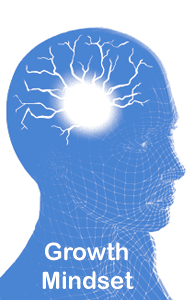
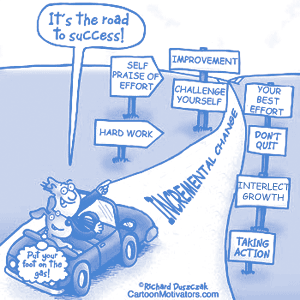
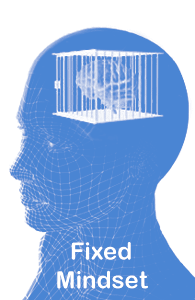













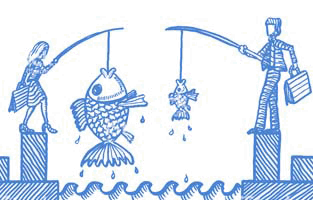











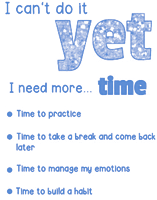

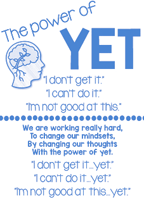
 Growth mindset and
fixed mindset
Growth mindset and
fixed mindset 
 How self
beliefs affect motivation and thus achievement. What
we believe about ourselves can greatly influence our
ability to get what we want out of life. Carol Dweck and
her associates have for many years investigated what
people believe about themselves and how this affects
their motivation, and their ability to accomplish tasks,
achieve goals, and function successfully in
life. She proposes, that people tend to have two
extremes of belief about themselves, that are the key to
their effectiveness or ineffectiveness. One extreme is
of a self that is an unchanging entity and the other
extreme is of a self that is constantly changing in
varying increments. Dweck asserts that one theory is
highly adaptive for the human condition (the theory of
an incremental changing self) while the other is
maladaptive for the human condition (the theory of a
self that is an unchanging entity). These self theories
can be termed respectively a growth mindset and a fixed
mindset. Curiously, this applies regardless of whether
the motivation is intrinsic or extrinsic. Although, as
we shall see, people with an extrinsic orientation tend
to also have a fixed mindset, and people who have an
intrinsic orientation tend also to have a growth
mindset.
How self
beliefs affect motivation and thus achievement. What
we believe about ourselves can greatly influence our
ability to get what we want out of life. Carol Dweck and
her associates have for many years investigated what
people believe about themselves and how this affects
their motivation, and their ability to accomplish tasks,
achieve goals, and function successfully in
life. She proposes, that people tend to have two
extremes of belief about themselves, that are the key to
their effectiveness or ineffectiveness. One extreme is
of a self that is an unchanging entity and the other
extreme is of a self that is constantly changing in
varying increments. Dweck asserts that one theory is
highly adaptive for the human condition (the theory of
an incremental changing self) while the other is
maladaptive for the human condition (the theory of a
self that is an unchanging entity). These self theories
can be termed respectively a growth mindset and a fixed
mindset. Curiously, this applies regardless of whether
the motivation is intrinsic or extrinsic. Although, as
we shall see, people with an extrinsic orientation tend
to also have a fixed mindset, and people who have an
intrinsic orientation tend also to have a growth
mindset.


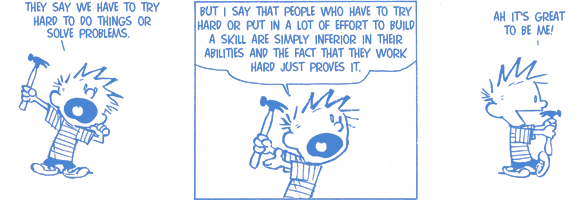









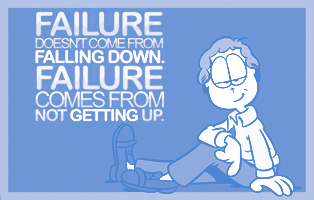
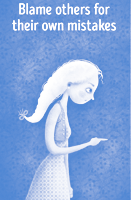
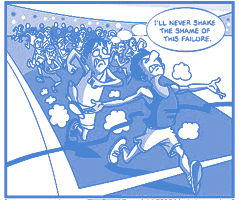
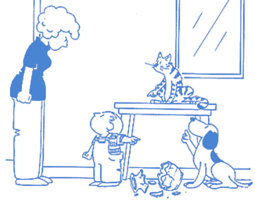

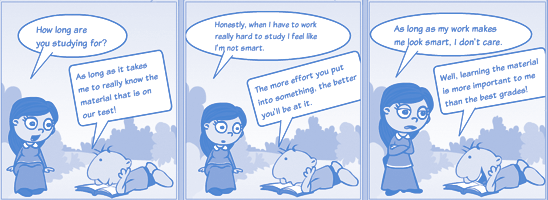




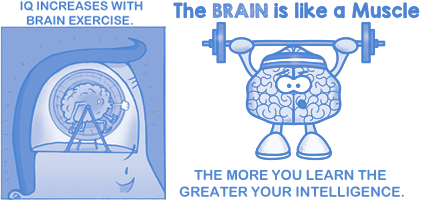
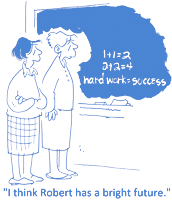
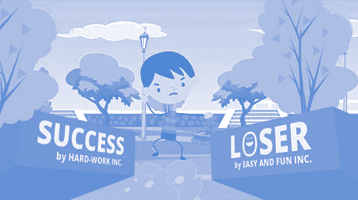




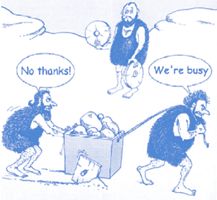
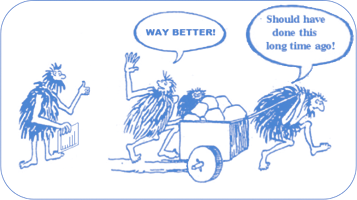





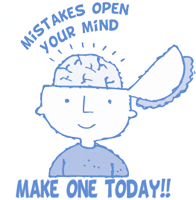
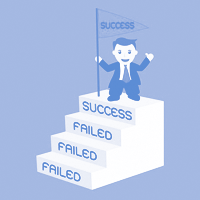
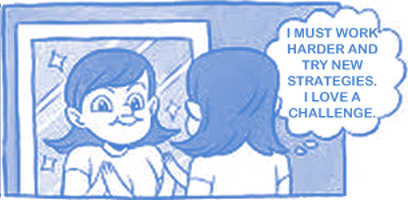
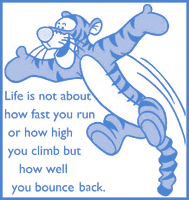




 Your brain
grows by being exercised. Carol Dweck and her
associates have developed a workshop for students who
were losing interest and motivation in schoolwork. The
purpose of the workshop is to move students from having
a fixed mindset to having a growth mindset by lending
academic authority to the growth mindset. The following
is a excerpt from what those students are taught in part
to instigate that change:
Your brain
grows by being exercised. Carol Dweck and her
associates have developed a workshop for students who
were losing interest and motivation in schoolwork. The
purpose of the workshop is to move students from having
a fixed mindset to having a growth mindset by lending
academic authority to the growth mindset. The following
is a excerpt from what those students are taught in part
to instigate that change:

 Knowledge of self theories. Carol Dweck has
just written a book called
Knowledge of self theories. Carol Dweck has
just written a book called 
 Nature versus nurture. Are we the puppets of
our genes or do we have freewill? Are we born with a
fixed amount of intelligence, or does our
intelligence build in increments over time
constantly growing and becoming more with our
growing knowledge? Are we born with fixed abilities,
or are these too developed over time in increments
depending on the amount of effort we put in and the
persistence we maintain?
Nature versus nurture. Are we the puppets of
our genes or do we have freewill? Are we born with a
fixed amount of intelligence, or does our
intelligence build in increments over time
constantly growing and becoming more with our
growing knowledge? Are we born with fixed abilities,
or are these too developed over time in increments
depending on the amount of effort we put in and the
persistence we maintain? 

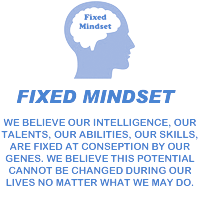

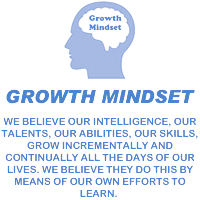



 GROWTH PRAISE. Facilitation by praise. In
terms of Carol Dweck's mindsets, good praise
means the reinforcing of the idea that you can
change what you are. If you seem less
intelligent you can learn and become more
intelligent. If you lack skills you can learn
them. If you are socially incompetent you can
learn how to be socially competent. If you are
not so beautiful you can do something about that
also. Here is what Dweck said, "If
the wrong kinds of praise lead kids down the
path of entitlement dependence and fragility,
maybe the right kinds of praise can lead them
down the path of hard work and greater
happiness."
How do you convey this? You praise the process
not the person. Praise how the person has
improved and is improving. If you praise the
person you send a message that their
intelligence, their talents, their abilities, or
their skills are fixed in that moment. This
encourages a fixed mindset. Praising someone's
work has similar problems. Of course you must be
able to give positive feedback but this can be
phrased to involve the praise of strategies and
improvement
GROWTH PRAISE. Facilitation by praise. In
terms of Carol Dweck's mindsets, good praise
means the reinforcing of the idea that you can
change what you are. If you seem less
intelligent you can learn and become more
intelligent. If you lack skills you can learn
them. If you are socially incompetent you can
learn how to be socially competent. If you are
not so beautiful you can do something about that
also. Here is what Dweck said, "If
the wrong kinds of praise lead kids down the
path of entitlement dependence and fragility,
maybe the right kinds of praise can lead them
down the path of hard work and greater
happiness."
How do you convey this? You praise the process
not the person. Praise how the person has
improved and is improving. If you praise the
person you send a message that their
intelligence, their talents, their abilities, or
their skills are fixed in that moment. This
encourages a fixed mindset. Praising someone's
work has similar problems. Of course you must be
able to give positive feedback but this can be
phrased to involve the praise of strategies and
improvement 

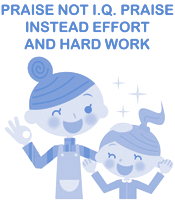
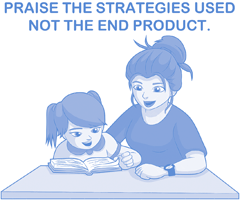
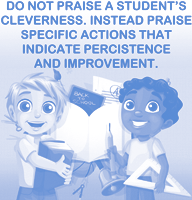
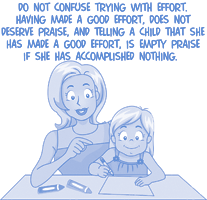
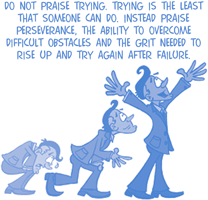

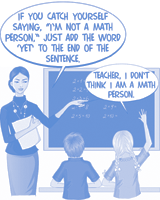

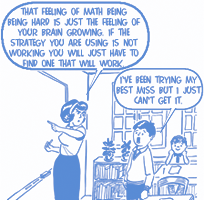
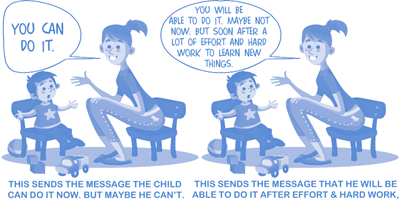
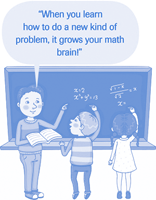

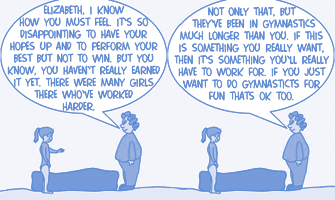

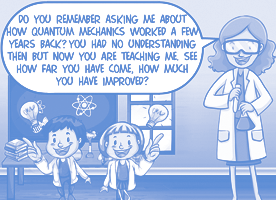


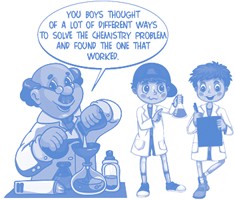
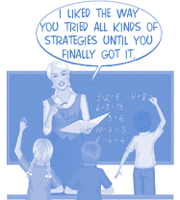


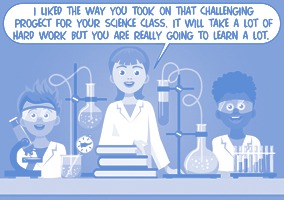

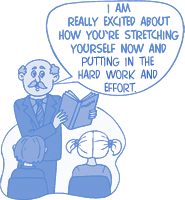

 Facilitation by Criticism. Growth Criticism. As with
praise, criticism can be a way of reinforcing the
mindset of the person being criticized. In her
book "Mindset" Carol Dweck Has this to say about
criticism:
Facilitation by Criticism. Growth Criticism. As with
praise, criticism can be a way of reinforcing the
mindset of the person being criticized. In her
book "Mindset" Carol Dweck Has this to say about
criticism: 
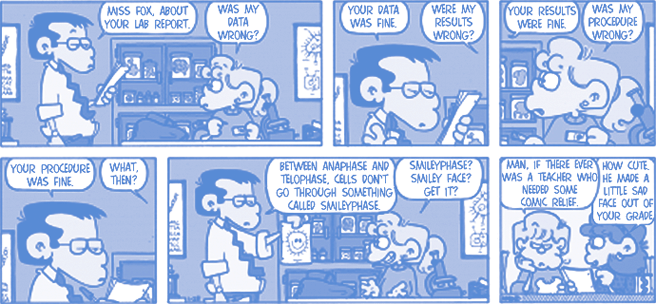




 Improvement. Drawing attention to
improvement is the easiest way of facilitating
the development of a growth mindset. The easiest
way to do this is to make a comparison between
how things are now and how they were in the
past. It would be very unusual if nothing were
learned. It is just a matter of, instead of
saying how good something is, you say how much
better it is than it was before. If you want to
say how clever someone is, say instead how much
more knowledgeable a learner has become compared
to years past. If you want to say how well your
child has done in his school work, simply tell
him how much better he has done this year
compared with last year. If you want to say how
beautiful and creative a piece of artwork is,
you simply say how much more beautiful and
creative it is compared with work the person has
done in the past. It is easy for teachers to say
how much some work has improved or how much more
the person knows than just a few months back,
because at school, we are in a position to be
absorbing knowledge at a phenomenal rate.
(Although many of us, unfortunately, are
forgetting it at a similar rate.) Still the
knowledge we have is always greater than before.
The skills we have, are always more than before.
Improvement. Drawing attention to
improvement is the easiest way of facilitating
the development of a growth mindset. The easiest
way to do this is to make a comparison between
how things are now and how they were in the
past. It would be very unusual if nothing were
learned. It is just a matter of, instead of
saying how good something is, you say how much
better it is than it was before. If you want to
say how clever someone is, say instead how much
more knowledgeable a learner has become compared
to years past. If you want to say how well your
child has done in his school work, simply tell
him how much better he has done this year
compared with last year. If you want to say how
beautiful and creative a piece of artwork is,
you simply say how much more beautiful and
creative it is compared with work the person has
done in the past. It is easy for teachers to say
how much some work has improved or how much more
the person knows than just a few months back,
because at school, we are in a position to be
absorbing knowledge at a phenomenal rate.
(Although many of us, unfortunately, are
forgetting it at a similar rate.) Still the
knowledge we have is always greater than before.
The skills we have, are always more than before.

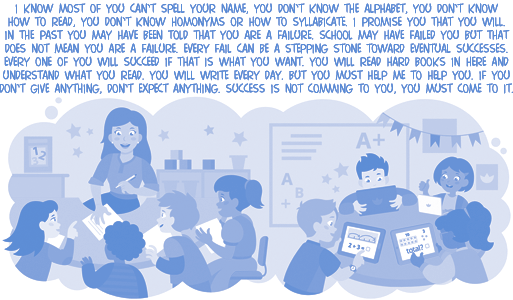
 Attitudes. Children with a growth mindset
usually turn out to have grown up in a household
where at least one of their parents has had a
growth mindset. These parents often indulge in a
kind of growth self talk which can rub off on
their children. Some such children when facing
difficulties say things like, "I hoped this
would be informative." or, "Mistakes
are our friends." or, "I love a good
challenge." Such children have clearly
grown up in a household where such comments are
often heard and so repeated. Such households,
must have been places where the unexpected was
embraced, challenges enjoyed and where failure
triggered determination to try again and do
better.
Attitudes. Children with a growth mindset
usually turn out to have grown up in a household
where at least one of their parents has had a
growth mindset. These parents often indulge in a
kind of growth self talk which can rub off on
their children. Some such children when facing
difficulties say things like, "I hoped this
would be informative." or, "Mistakes
are our friends." or, "I love a good
challenge." Such children have clearly
grown up in a household where such comments are
often heard and so repeated. Such households,
must have been places where the unexpected was
embraced, challenges enjoyed and where failure
triggered determination to try again and do
better. 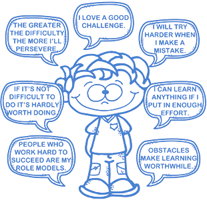

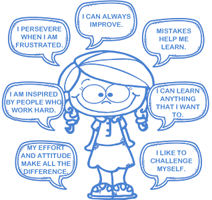






 My success is your failure
My success is your failure  One of the stranger things about fixed mindsets is
the way they react to other peoples success. While
people with a growth mindset tend to see other
people's successes as an inspiration to a goal that
is achievable because it has been done. Fixed
mindset people do not see it that way.
One of the stranger things about fixed mindsets is
the way they react to other peoples success. While
people with a growth mindset tend to see other
people's successes as an inspiration to a goal that
is achievable because it has been done. Fixed
mindset people do not see it that way. 

